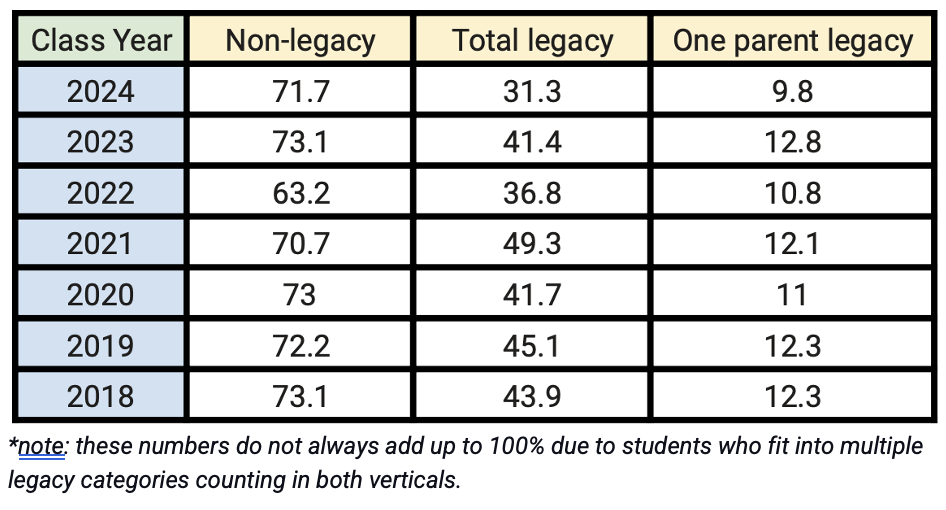We hear it all the time. “I went to Harvard… does that mean my kid will get in?” It’s an important question for a lot of the parents of students we work with and it’s a harder question to answer than some might think. Every year we work with legacy students whose parents have realized that simply being a legacy isn’t enough to get into a top school. Being a legacy isn’t everything, but it can help. Your next question is probably, “But how much exactly does it help at a place like Harvard?” We wanted to break it down and talk about the ins and outs of legacy status at Harvard.
What makes you a legacy at Harvard?
Annoyingly, Harvard doesn’t release a lot of information about legacy admissions. We talk to admissions officers all the time (and comb through a lot of data) and not releasing legacy information isn’t uncommon at top schools. However, it can make it hard for parents and students to find information. Harvard never formally defines legacy status in their materials, but their admissions office has said:
“Are a student’s chances of admission enhanced if a relative has attended Harvard? The application process is the same for all candidates. Among a group of similarly distinguished applicants, the daughters and sons of College alumni/ae may receive an additional look.”
This is kind of an oxymoron. Having a parent that went to Harvard doesn’t help, but we will look more at a candidate if they have a parent that went to Harvard… While Harvard doesn’t directly define what makes you a legacy, their application only asks about parents' and siblings' education and only mentions parents in their materials. While Harvard doesn’t confirm it, it is safe to say that “legacy” means having a parent that went to Harvard… however they do report more data than just parents.
Let’s look at some numbers first.
For several years, Harvard has done a freshman survey. They ask over 75% of freshmen about their backgrounds. The survey has some interesting and pretty consistent numbers. They define legacy not only by parental status, but also through siblings, one parent or parents, one grandparent, multiple grandparents, aunts and uncles, and other relatives. While they track multiple connections, only parents and siblings are reported in the Common App and one parent has historically been the largest.
So once on campus, about 30% of students are legacy students. This is a fairly high number of legacies, but that doesn’t mean every legacy applicant gets in.
How many legacies do they accept?
While about 30% of Harvard students are legacy students, you may be asking yourself, how many do they let in? These numbers are harder to find. Harvard probably doesn’t want to make it easily googleable. There have been a growing number of think pieces and op-eds calling into question the morality of legacy admissions and Harvard knows that. Their admissions office has to strike a delicate balance between letting in legacy students and accepting students based solely on merit.
That being said, between 2014 and 2019, the acceptance rate for legacies was 33 percent. Harvard’s overall acceptance rate of only about 6 percent. Harvard wouldn’t release this information themselves… it was released as part of a trial where Harvard was sued over unfair admissions. Did a lawsuit make them change their admissions numbers intensely? It seems like no. The numbers of freshman legacies who attended Harvard between 2019 and 2018 are in line with more recent years post-suit.
While we can’t say it definitely, being a legacy makes it easier to get in (or at least it has in the past.) This is good news for legacy applicants, but we urge parents not to get too comfortable. Even if your child is a legacy, they need to stand out. Harvard doesn’t take the majority of its legacy candidates, so your child has to be a top candidate amongst other legacies.
Ok, so that means my kid will get in?
Even at its peak, Harvard was only accepting 33% of legacies. It’s a lot easier than the overall 6%, but it’s not a slam dunk. Your student still has to be a good candidate. That means good grades, test scores, extracurriculars, and a great essay. There are a lot of legacies. Your legacy needs to still stand out.
There are other factors that make legacies stand out. We aren’t saying you have to donate a library or that your kid has to be being scouted for volleyball, but we aren’t saying that would hurt their chances. If that isn’t on the table for your family, we advise working with a college counselor. Maybe that is a little self-serving, but legacies have to turn in great applications just like any other student. We help our students make the strongest application possible. And we know from experience, that standing out with a great essay and writing supplement can make the difference between getting in and not as a legacy.
Harvard has a large legacy population which means, it is easier for legacies to get in on some level. However, if your student is dreaming of Harvard, simply being a legacy is not enough. They need to make sure they are a strong candidate and honestly, having them apply early decision is probably a good call. Harvard is so hard to get into that they should be gripping on to every advantage that they can and we can help.
Need help navigating the Ivies? It’s what we do! Contact us here.
